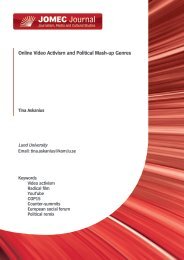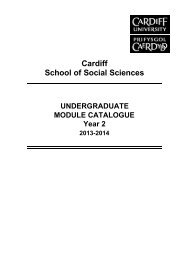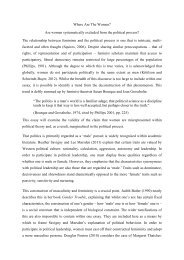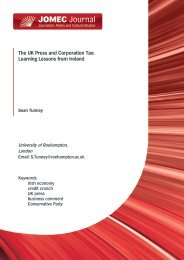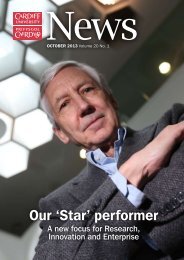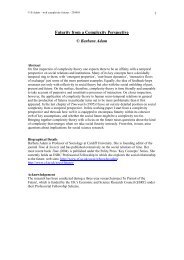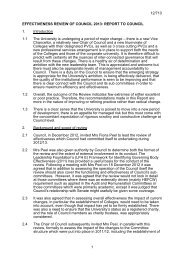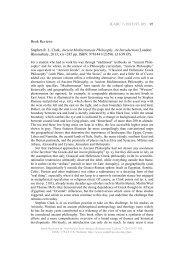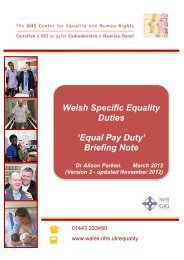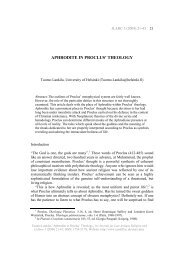Public Perceptions of Climate Change and ... - Cardiff University
Public Perceptions of Climate Change and ... - Cardiff University
Public Perceptions of Climate Change and ... - Cardiff University
Create successful ePaper yourself
Turn your PDF publications into a flip-book with our unique Google optimized e-Paper software.
WSA Working Paper Series ISSN 2050-8522<br />
<strong>Public</strong> <strong>Perceptions</strong> <strong>of</strong> <strong>Climate</strong> <strong>Change</strong> <strong>and</strong> Energy<br />
Futures Before <strong>and</strong> After the Fukushima Accident: A<br />
Comparison between Britain <strong>and</strong> Japan<br />
Wouter Poortinga <strong>and</strong> Midori Aoyagi<br />
WSA Working Paper 01-2013
First published in January 2013 by the Welsh School <strong>of</strong> Architecture<br />
Welsh School <strong>of</strong> Architecture, <strong>Cardiff</strong> <strong>University</strong><br />
Bute Building, King Edward VII Avenue<br />
<strong>Cardiff</strong> CF10 3NB, Wales, United Kingdom<br />
Tel: +44 (0)29 2087 6097<br />
Fax: +44 (0)29 2097 4623<br />
Email: PoortingaW@cardiff.ac.uk<br />
Web: http://www.cardiff.ac.uk/archi/working_papers.php<br />
WSA Working Paper Series ISSN 2050-8522<br />
Paper Number: 01-2013<br />
<strong>Public</strong> <strong>Perceptions</strong> <strong>of</strong> <strong>Climate</strong> <strong>Change</strong> <strong>and</strong> Energy Futures Before <strong>and</strong> After the<br />
Fukushima Accident: A Comparison between Britain <strong>and</strong> Japan<br />
Wouter Poortinga <strong>and</strong> Midori Aoyagi<br />
Email: PoortingaW@cardiff.ac.uk<br />
Disclaimer<br />
All opinions expressed in this working paper are those <strong>of</strong> the author(s) alone <strong>and</strong> should not<br />
be regarded as the views <strong>of</strong> the Welsh School <strong>of</strong> Architecture or <strong>of</strong> <strong>Cardiff</strong> <strong>University</strong>. The<br />
copyright is retained by the author(s).<br />
2
Contents<br />
Contents ............................................................................................................................... 3<br />
Abstract................................................................................................................................. 4<br />
Acknowledgments ................................................................................................................. 4<br />
Introduction ........................................................................................................................... 5<br />
Background ....................................................................................................................... 5<br />
The Research .................................................................................................................... 8<br />
Results ................................................................................................................................ 10<br />
<strong>Public</strong> <strong>Perceptions</strong> <strong>of</strong> <strong>Climate</strong> <strong>Change</strong>............................................................................. 10<br />
Attitudes to Different Forms <strong>of</strong> Electricity Generation ....................................................... 11<br />
Attitudes to Nuclear Power .............................................................................................. 13<br />
Main Findings <strong>and</strong> Conclusions .......................................................................................... 19<br />
References ......................................................................................................................... 23<br />
Appendix ............................................................................................................................. 27<br />
3
Abstract<br />
The threats posed by climate change call for strong action from the international community<br />
to limit carbon emissions. Before the Fukushima accident that followed the earthquake <strong>and</strong><br />
tsunami on 11 March 2011, both Britain <strong>and</strong> Japan were considering an ambitious expansion<br />
<strong>of</strong> nuclear power as part <strong>of</strong> their strategy to reduce carbon emissions. However, the accident<br />
may have thrown nuclear as a publicly acceptable energy technology into doubt. This study<br />
uses several nationally representative surveys from before <strong>and</strong> after the Fukushima accident<br />
to examine how it may have changed public perceptions <strong>of</strong> climate change <strong>and</strong> energy<br />
futures in Britain <strong>and</strong> Japan. The study found that already before the accident the Japanese<br />
public were less supportive <strong>of</strong> nuclear power than the British. Whereas British attitudes have<br />
remained remarkably stable over time, the Japanese public appear to have lost complete<br />
trust in nuclear safety <strong>and</strong> regulation, <strong>and</strong> have become less accepting <strong>of</strong> nuclear power,<br />
even if it would contribute to climate change mitigation or energy security. In Japan the<br />
public are now less likely to think that any specific energy source will contribute to a reliable<br />
<strong>and</strong> secure supply <strong>of</strong> energy. The implications for energy policy are discussed.<br />
Key Words: Fukushima; <strong>Public</strong> <strong>Perceptions</strong>; Nuclear Power; <strong>Climate</strong> <strong>Change</strong>; Cross-<br />
Cultural Comparison<br />
Acknowledgments<br />
This research was conducted as part <strong>of</strong> the FY2012 Japan Society for the Promotion <strong>of</strong><br />
Science (JSPS) Invitation Fellowship for Research in Japan (Short-Term). We would like to<br />
thank the JSPS for their generous support (S-12008). We also would like to thank Pr<strong>of</strong>essor<br />
Nick Pidgeon, who led the Leverhulme Trust (RSK990021 <strong>and</strong> F/00 407/AG) <strong>and</strong> ESRC<br />
(RES-152-25-1011 <strong>and</strong> RES-062-23-113) funded projects on “<strong>Public</strong> Risk <strong>Perceptions</strong>,<br />
<strong>Climate</strong> <strong>Change</strong> <strong>and</strong> Reframing <strong>of</strong> UK Energy Policy” <strong>and</strong> “<strong>Public</strong> <strong>Perceptions</strong> <strong>of</strong> <strong>Climate</strong><br />
<strong>Change</strong> <strong>and</strong> Energy Choices in Britain”, as well as the British Science Association (BSA) for<br />
repeating some <strong>of</strong> the items in 2011. There were many others who have made the research<br />
in Japan <strong>and</strong> the UK possible. We are grateful for their involvement <strong>and</strong> contributions.<br />
4
Introduction<br />
Background<br />
<strong>Climate</strong> change is arguably the greatest challenge the world is currently facing. The threats<br />
posed by climate change calls for strong action from the international community to limit<br />
Greenhouse Gas (GHG) emissions. Both UK <strong>and</strong> Japan Governments have set themselves<br />
ambitious long-term domestic targets that go well beyond the Kyoto Protocol. The UK<br />
<strong>Climate</strong> <strong>Change</strong> Act 2008 provides a legally binding target <strong>of</strong> an 80% reduction in GHG<br />
emissions by 2050, with an interim target <strong>of</strong> 34% by 2020. Japan’s policy is to achieve an<br />
emission reduction <strong>of</strong> 25% by 2020 <strong>and</strong> 80% by 2050. These targets necessitate<br />
fundamental changes to the way energy is used <strong>and</strong> produced, <strong>and</strong> are unlikely to be met<br />
without widespread engagement <strong>and</strong> approval from the general public. Not only does the<br />
public need to personally change their behaviour in order to reduce energy consumption <strong>and</strong><br />
to comply with wider policies aimed at motivating these changes, they also need to accept<br />
new low-carbon technologies <strong>and</strong> facilities to de-carbonise their energy use (Spence &<br />
Pidgeon, 2009).<br />
Within this context, nuclear power has in recent years been promoted as a low-carbon<br />
technology that may help to mitigate climate change <strong>and</strong> at the same time increase energy<br />
security (Bickerstaff et al., 2008). While arguments regarding the role <strong>of</strong> nuclear power in<br />
delivering a secure supply <strong>of</strong> energy have been made since the oil crises in the 1970s, it is<br />
only since the early 2000s that nuclear power has been framed explicitly as a means to<br />
address climate change (Pidgeon et al., 2008). Over the last decade various industry <strong>and</strong><br />
government actors in the UK, as well as a number <strong>of</strong> prominent environmentalists, including<br />
James Lovelock (2004) <strong>and</strong> George Monbiot (2009), have expressed support for new<br />
nuclear built to help combat climate change. Previous studies suggest that this reframing<br />
argument has resulted in some changes in public attitudes towards nuclear power over the<br />
past decade. A significant proportion <strong>of</strong> the British public is now willing to ‘reluctantly accept’<br />
nuclear power as a means <strong>of</strong> addressing the greater threat <strong>of</strong> climate change (e.g. Pidgeon<br />
et al., 2008; Corner, et al., 2011). However, while the public is willing to consider the nuclear<br />
option, it is not embraced wholeheartedly. It has therefore been suggested that this<br />
‘conditional support’ is fragile. Pidgeon et al. (2008) argued that, in the absence <strong>of</strong> any major<br />
accident since Chernobyl, the public may have become less attentive to the risks <strong>of</strong> nuclear<br />
power, <strong>and</strong> that latent concerns are likely to re-emerge in case <strong>of</strong> major accident, possibly<br />
amplified with considerable force.<br />
Nuclear energy has for a long time been a national strategic priority in Japan <strong>and</strong> was one <strong>of</strong><br />
the main pillars <strong>of</strong> Japan’s policy to achieve future carbon emission reductions. The 2010<br />
Strategic Energy Plan committed to radical reductions in GHG emissions through<br />
investments in renewable energy, the promotion <strong>of</strong> energy conservation, <strong>and</strong> an ambitious<br />
expansion <strong>of</strong> Japan’s nuclear energy generating capacity from 26% in 2010 to nearly 50% in<br />
2030 (Cyranoski, 2012). However, the accident at the Fukushima Dai-ichi nuclear power<br />
plant that followed the devastating Great East Japan earthquake <strong>and</strong> tsunami on the 11 th <strong>of</strong><br />
March 2011 has thrown nuclear power as a publicly acceptable energy technology into doubt.<br />
5
Before the accident, public support <strong>and</strong> trust in the regulation <strong>of</strong> nuclear power had already<br />
been seriously tested following a series <strong>of</strong> accidents in Japan, most notably the criticality<br />
accident at the Tokai-mura uranium reprocessing facility killing two workers (<strong>and</strong> exposing<br />
many others to high doses <strong>of</strong> radiation), the steam explosion at Mihama nuclear power plant<br />
killing 4 workers <strong>and</strong> injuring 7 more, <strong>and</strong> the leakage <strong>of</strong> radioactive water from the<br />
Kashiwazaki-Kariwa nuclear power plant after the 2007 Chūetsu <strong>of</strong>fshore earthquake<br />
(Cyranoski, 2010). Various scholars have argued that these accidents show that the<br />
Japanese Government <strong>and</strong> the nuclear industry have been far too lax in the development<br />
<strong>and</strong> operation <strong>of</strong> nuclear policies <strong>and</strong> facilities, <strong>and</strong> that public safety has not been their main<br />
priority (Nkamura & Kikuchi, 2012; NAIIC, 2012). Indeed, at the turn <strong>of</strong> the century, after a<br />
series <strong>of</strong> accidents, public support for nuclear power reached an all-time low in Japan, as did<br />
trust in Japan’s nuclear energy policy (OECD, 2010).<br />
The investigations into the causes <strong>of</strong> the Fukushima disaster show that public distrust in the<br />
safety <strong>and</strong> management <strong>of</strong> nuclear power installations was to some degree warranted. Both<br />
the investigation <strong>of</strong> the privately funded Rebuild Japan Initiative Foundation <strong>and</strong> the NAIIC (1)<br />
investigation ordered by the National Diet <strong>of</strong> Japan concluded that Fukushima was a manmade<br />
disaster rather than caused directly by the earthquake <strong>and</strong> ensuing tsunami<br />
(Funabashi & Kitazawa, 2012; NAIIC, 2012). The reports suggest that, notwithst<strong>and</strong>ing the<br />
complexity <strong>of</strong> the situation or the cascading effects <strong>of</strong> the unfolding emergency, the<br />
Fukushima accident was ultimately preventable (Funabashi & Kitazawa, 2012). That is, all<br />
the direct causes <strong>of</strong> the accident were foreseeable prior to the accident. However, the<br />
operator, Government, <strong>and</strong> regulators failed to meet the most basic safety requirements or<br />
to put appropriate procedures <strong>and</strong> training in place for an effective response to critical<br />
situations (NAIIC, 2012). The conclusions <strong>of</strong> the independent commissions are likely to have<br />
further eroded public trust in the safety <strong>and</strong> management <strong>of</strong> the nuclear power stations.<br />
Earthquakes <strong>and</strong> tsunamis are unpredictable but unavoidable events in Japan <strong>and</strong> should<br />
therefore have been central to any risk assessment <strong>and</strong> emergency planning in nuclear<br />
installations. However, even after a number <strong>of</strong> nuclear accidents in the 1990s <strong>and</strong> 2000s,<br />
some <strong>of</strong> which were triggered by an earthquake, the industry <strong>and</strong> its regulators failed to<br />
ensure that appropriate emergency procedures were in place (NAIIC, 2012).<br />
After the Fukushima accident all Japan’s nuclear power plants have either been closed or<br />
had their operation suspended for safety inspections <strong>and</strong> maintenance, leaving Japan<br />
temporarily without nuclear-produced electricity in 2012. The announcement <strong>of</strong> the decision<br />
to restart two nuclear reactors led to – for Japan – unprecedented demonstrations (BBC,<br />
2012), showing the extent <strong>of</strong> public opposition <strong>and</strong> distrust in the safety <strong>and</strong> management <strong>of</strong><br />
nuclear power in the wake <strong>of</strong> Fukushima accident. While there have been sizable <strong>and</strong> wellorganised<br />
anti-nuclear movements in both Europe <strong>and</strong> the US since the 1970s, the antinuclear<br />
movement in Japan has generally been smaller than its Western counterparts <strong>and</strong><br />
tended to focus on military applications <strong>of</strong> nuclear technology rather than civilian nuclear<br />
power (Valentine & Sovacool, 2010; Hasegawa, 2011). The Fukushima accident <strong>and</strong> –<br />
perhaps more importantly – the nationwide loss <strong>of</strong> trust in Japan’s nuclear industry <strong>and</strong><br />
government, may have sparked the beginning <strong>of</strong> a better organised anti-nuclear movement<br />
(1)<br />
National Diet <strong>of</strong> Japan Fukushima Nuclear Accident Independent Investigation Commission<br />
6
esisting the use <strong>of</strong> civilian nuclear technology. This may have pr<strong>of</strong>ound consequences for<br />
the future direction <strong>of</strong> Japan’s energy policy, as shown by the relative success <strong>of</strong> antinuclear<br />
movements in the US <strong>and</strong> Europe to slow down the expansion <strong>of</strong> nuclear power<br />
(Hasegawa, 2011). Indeed, in a dramatic departure from its pre-Fukushima energy policy,<br />
the Japanese Government unveiled in September 2012 plans to phase out nuclear power<br />
before 2040 –although it declared a number <strong>of</strong> days later that Japan’s future energy policy<br />
would be developed “with flexibility based on tireless verification <strong>and</strong> re-examination”,<br />
leaving open the option <strong>of</strong> continuing Japan’s existing nuclear power plants. This shows that<br />
Fukushima has fundamentally changed the debate on the role <strong>of</strong> nuclear power in Japan’s<br />
future energy mix <strong>and</strong> strained the relationship between the general public <strong>and</strong> the<br />
Japanese Government. However, the change in policy can <strong>of</strong> course not solely be attributed<br />
to the influence <strong>of</strong> public opinion.<br />
The accident at the Fukushima Dai-ichi nuclear power plant has had ramifications beyond<br />
Japan, substantially reshaping nuclear agendas <strong>and</strong> policies across the world (Jorant, 2011).<br />
This is perhaps most dramatically shown in Germany’s decision to phase out nuclear power<br />
by 2022 in response to continuing public opposition <strong>and</strong> demonstrations in the wake <strong>of</strong> the<br />
accident – thereby revoking recent preceding policy decisions to continue its use (Pfister &<br />
Böhm, 2012). While Germany has already established itself as a leader in renewable energy<br />
technology <strong>and</strong> generation (Wittneben, 2012), it will face major challenges in replacing the<br />
lost capacity by other forms <strong>of</strong> low-carbon energy generation in order to meet its carbon<br />
reduction targets. In contrast, UK policymakers remain fully committed to their decision to<br />
increase the share <strong>of</strong> nuclear power in the energy mix. These show very different policy<br />
responses to one <strong>of</strong> the most serious nuclear accidents in history.The UK Office for Nuclear<br />
Regulation concluded that “In considering the direct causes <strong>of</strong> the Fukushima accident we<br />
see no reason for curtailing the operation <strong>of</strong> nuclear power plants or other nuclear facilities in<br />
the UK” (cited in Butler et al., 2011). Crucially, this was before the damning conclusions <strong>of</strong><br />
the independent investigations that the Fukushima accident was a man-made rather than a<br />
natural disaster. UK policy makers however still consider nuclear power as an important part<br />
<strong>of</strong> the transition to a low-carbon economy (Schneider et al., 2012).<br />
If Japan is to phase out nuclear from its energy mix, it is imperative that the lost capacity is<br />
met by other low-carbon sources so that it still can meet its carbon reduction targets. Japan<br />
has seen a substantial increase in carbon emissions as it has been forced to import more oil<br />
<strong>and</strong> natural gas to fill the energy gap created by the shutdown <strong>of</strong> its nuclear power stations.<br />
A continued reliance on oil <strong>and</strong> natural gas may call into question Japan’s ability to reduce<br />
CO 2 emissions by 25% by 2020. If conventional fossil fuels were to replace nuclear in the<br />
longer term, CO 2 emissions would soar by between 60 <strong>and</strong> 250 million tonnes (IEE, 2012).<br />
This shows the need for the development <strong>of</strong> other low-carbon technologies to avoid the<br />
shortfall in energy generating capacity is being met by high-carbon alternatives, such as coal<br />
<strong>and</strong> oil. While there are other low-carbon scenarios that can lead to the targeted carbon<br />
reductions in Japan, including the large-scale deployment <strong>of</strong> renewable sources <strong>and</strong> energy<br />
dem<strong>and</strong> reduction (e.g. Shimada et al., 2007; Fujino et al., 2008), these alternative pathways<br />
need to be supported by the general public as well. Case studies from around the world<br />
have shown that community opposition can lead to delays or even cancelation <strong>of</strong> the<br />
deployment <strong>and</strong> siting <strong>of</strong> low-carbon energy technologies (Pidgeon et al., 2008), while<br />
7
mitigating climate change through energy dem<strong>and</strong> reduction requires serious commitment<br />
from the general public to change their own behaviour (Poortinga et al., 2012).<br />
The Research<br />
In this study we compare public perceptions <strong>of</strong> climate change <strong>and</strong> energy futures in Britain<br />
<strong>and</strong> Japan using a series <strong>of</strong> quantitative surveys that were conducted at different stages<br />
before <strong>and</strong> after the Fukushima accident. This comparison is conducted to identify how the<br />
Fukushima accident may have changed public opinion on climate change <strong>and</strong> nuclear power<br />
in the two countries, as well as the acceptability <strong>of</strong> alternative energy options. These crosscultural<br />
comparisons are relevant, as nuclear power was part <strong>of</strong> both Britain’s <strong>and</strong> Japan’s<br />
strategy to achieve future carbon emission reductions. While Fukushima is likely to have<br />
seriously affected Japanese public attitudes to nuclear power, its impact on British public<br />
opinion is less clear. While the studies were conducted for a number <strong>of</strong> reasons <strong>and</strong> under<br />
different circumstances, they all contained items that can be used for cross-national<br />
comparisons. The datasets include the “<strong>Public</strong> Risk <strong>Perceptions</strong>, <strong>Climate</strong> <strong>Change</strong> <strong>and</strong><br />
Reframing <strong>of</strong> UK Energy” <strong>and</strong> “<strong>Public</strong> <strong>Perceptions</strong> <strong>of</strong> <strong>Climate</strong> <strong>Change</strong> <strong>and</strong> Energy Choices in<br />
Britain” surveys that were conducted in Britain in 2005 <strong>and</strong> 2010 respectively. The third<br />
British dataset is a survey commissioned by the British Science Foundation (BSA) in 2011<br />
as part <strong>of</strong> the British Science festival. These British surveys will be compared with a series <strong>of</strong><br />
nation-wide public opinion surveys conducted in 2007 <strong>and</strong> 2011 in Japan. The surveys<br />
covered widely similar topics <strong>and</strong> items, although not all items were included in each <strong>of</strong> the<br />
surveys. We therefore will only make cross-national <strong>and</strong> pre <strong>and</strong> post Fukushima<br />
comparisons where possible. Although these comparisons are admittedly crude – as the<br />
studies were not specifically designed to examine the impacts <strong>of</strong> Fukushima –the surveys<br />
are the only nationally representative datasets that are available for that purpose. Box A<br />
provides details <strong>of</strong> the five datasets. The studies will be referred to as GB2005, GB2010 <strong>and</strong><br />
GB2011, <strong>and</strong> JP2007 <strong>and</strong> JP2011, respectively.<br />
8
Box A: The Surveys<br />
GB2005: The first British survey was conducted between 1 October <strong>and</strong> 6 November 2005.<br />
A national representative quota sample <strong>of</strong> 1,491 people aged 15 years <strong>and</strong> older was<br />
interviewed face-to-face in their own homes by the market <strong>and</strong> opinion research company<br />
MORI (see Poortinga et al., 2006 for more details).<br />
GB2010: The second British survey was conducted between 6 January <strong>and</strong> 26 March, 2010.<br />
A nationally representative quota sample <strong>of</strong> the British population aged 15 years <strong>and</strong> older<br />
(i.e. Engl<strong>and</strong>, Scotl<strong>and</strong> <strong>and</strong> Wales; n=1,822) were interviewed face-to-face in their own<br />
homes by trained Ipsos-MORI interviewers (see Spence et al., 2010 for more details).<br />
GB2011: The third British survey was conducted between 26 August 2011 <strong>and</strong> 29 August<br />
2011. Populus interviewed a r<strong>and</strong>om sample <strong>of</strong> 2,050 adults online <strong>and</strong> subsequently<br />
weighted the sample to make it representative <strong>of</strong> the British adult population. The data were<br />
collected by the British Science Association (BSA) for the 2012 British Science Festival.<br />
JP2007: The first Japan survey was conducted between 11 <strong>and</strong> 28 January 2007 (which is<br />
in the 2006 Fiscal Year). The data collection was done by Shin Joho Center Inc. A nationally<br />
representative sample <strong>of</strong> 959 people aged 20 years <strong>and</strong> older was interviewed face-to-face<br />
in their own homes.<br />
JP2011: The second Japan survey was conducted between 7 <strong>and</strong> 24 <strong>of</strong> July 2011. A<br />
quantitative survey was undertaken nation-wide in Japan by Central Research Services Inc.<br />
A nationally representative sample <strong>of</strong> 1,399 people aged 20 years <strong>and</strong> older was interviewed<br />
face-to-face in their own homes (Aoyagi et al., 2011).<br />
9
Results<br />
<strong>Public</strong> <strong>Perceptions</strong> <strong>of</strong> <strong>Climate</strong> <strong>Change</strong><br />
Table 1 shows public perceptions <strong>of</strong> the reality <strong>of</strong> climate change in Britain <strong>and</strong> Japan<br />
respectively. In 2005 an overwhelming majority (91%) <strong>of</strong> the British public thought that the<br />
world’s climate is changing. This majority dropped significantly to 78% in 2010. At the same<br />
time, the group <strong>of</strong> individuals who expressed trend sceptical views, i.e. those who do not<br />
think that the world’s climate is changing, grew from 4% in 2005 to 15% in 2010 (Poortinga<br />
et al., 2011).<br />
No major differences were found in japan between 2007 <strong>and</strong> 2011. In 2007 an overwhelming<br />
majority (95%) <strong>of</strong> the Japanese public thought that the world’s climate is changing, with only<br />
very few (3%) thinking it was not. A similar pattern was found when the survey was repeated<br />
in 2011: while 92% thought that the world’s climate is changing, 5% thought it is not.<br />
Table 1. As far as you know, do you personally think that the world’s climate is<br />
changing (in %).<br />
Yes No Don’t Know<br />
Great Britain 2010 (n=1,822) 78 15 6<br />
2005 (n=1,491) 91 4 5<br />
Japan 2011 (n=1,339) 92 5 3<br />
2007 (n=911) 95 3 2<br />
Note: The percentages in the table may not always add up to 100% due to rounding.<br />
These results show that, while trend scepticism has gained some ground in Britain, it is still<br />
virtually non-existent in Japan. It is however important to note that, despite the increase,<br />
trend scepticism still not very common in Britain either. Furthermore there are indications<br />
that the observed drop in public belief in climate change in 2010 is due to a unique<br />
convergence <strong>of</strong> circumstances, including ‘climategate’ <strong>and</strong> the economic downturn. The<br />
most recent evidence suggests that the decline in public belief in climate change has been<br />
temporary, <strong>and</strong> may be returning to higher levels <strong>of</strong> concern. Given that the economic<br />
downturn is still ongoing, it may take some time before concerns reach pre-crisis levels<br />
(Whitmarsh et al., under review).<br />
10
Attitudes to Different Forms <strong>of</strong> Electricity Generation<br />
Attitudes to different form <strong>of</strong> electricity generation were assessed differently in Britain <strong>and</strong><br />
Japan. Whereas respondents in Britain were asked how favourable or unfavourable their<br />
overall opinions or impressions are <strong>of</strong> the different forms <strong>of</strong> electricity generation, in Japan<br />
they were asked to what degree they agreed that the different forms <strong>of</strong> electricity generation<br />
will make a substantial contribution to reliable <strong>and</strong> secure supplies <strong>of</strong> electricity in Japan in<br />
the future. The results in Britain are therefore more likely to reflect a person’s general<br />
affective response to the different energy sources, while in Japan they are more likely to<br />
represent expectations regarding future electricity generation. As affective responses tend to<br />
be more stable over time than cognitive responses (e.g. Diener & Larsen, 1984), it can be<br />
expected that the Japan results are more changeable <strong>and</strong> will more closely track changes in<br />
energy policy. Despite these differences, we will report the findings for the two countries so<br />
that we will be able to track opinions regarding the different form <strong>of</strong> electricity generation<br />
over time in both Britain <strong>and</strong> Japan without claiming to make cross-national comparisons.<br />
Figure 1a. How favourable are your overall opinions or impressions <strong>of</strong> the following<br />
energy sources for producing electricity currently (% mainly or very favourable)<br />
Figure 1a shows that the overall patterns <strong>of</strong> favourability judgments were to a large rextent<br />
comparable in 2010 <strong>and</strong> 2005. Overall, the renewable options were regarded most<br />
favourably (solar, wind hydroelectric), followed by biomass <strong>and</strong> gas. Nuclear <strong>and</strong> fossil fuels<br />
were by far the least favoured forms <strong>of</strong> electricity generation. Biomass was perceived slightly<br />
more favourably, while oil was perceived slightly less favourably in 2010 as compared to<br />
2005. Figure 1a also shows that only around a third <strong>of</strong> the British public had mainly or very<br />
favourable impressions <strong>of</strong> nuclear power in 2005, 2010, <strong>and</strong> 2011, <strong>and</strong> that these<br />
impressions remained surprisingly stable over the six year period. These results suggest that<br />
the Fukushima accident has had no substantive impact on the perceived favourability <strong>of</strong><br />
nuclear power in Britain.<br />
11
Figure 1b. To what extent do you agree or disagree that the following energy sources<br />
will make a substantial contribution to reliable <strong>and</strong> secure supplies <strong>of</strong> electricity in<br />
Japan (% tend to/strongly agree)<br />
Figure 1b shows the level <strong>of</strong> agreement that the different energy sources will make a<br />
substantial contribution to reliable <strong>and</strong> secure supplies <strong>of</strong> electricity in Japan in the future.<br />
The overall pattern <strong>of</strong> responses is comparable to the one observed for Britain. In 2007, a<br />
clear majority <strong>of</strong> the Japanese public thought that sun/solar, wind <strong>and</strong> hydroelectric power<br />
will make a substantial contribution to reliable <strong>and</strong> secure supplies <strong>of</strong> energy in Japan,<br />
followed by biomass <strong>and</strong> gas. A minority <strong>of</strong> less than 30% thought that nuclear, oil <strong>and</strong> gas<br />
will make a substantial contribution to energy security.<br />
Fewer people in 2011 than in 2007 thought that any <strong>of</strong> the eight energy sources will make a<br />
substantial contribution to energy security in the future. The biggest decrease was found for<br />
renewables (in particular wind, hydroelectric <strong>and</strong> biomass) <strong>and</strong> nuclear power. The results<br />
regarding nuclear power are perhaps not surprising in the light <strong>of</strong> the Fukushima accident<br />
<strong>and</strong> the consequent shutdown <strong>of</strong> most nuclear power stations in Japan. However, the other<br />
changes are more difficult to interpret. The most likely explanation is that the Japanese<br />
public think that renewables may not be sufficient or cannot be developed fast enough to<br />
plug the energy gap left by the closure <strong>of</strong> nuclear power plants. It is also a possibility that the<br />
results reflect more generic concerns regarding energy security, considering there was a<br />
reduction for all eight energy sources.<br />
12
Attitudes to Nuclear Power<br />
The surveys in Britain <strong>and</strong> Japan contained a variety <strong>of</strong> items to assess different aspects <strong>of</strong><br />
public attitudes towards nuclear power, including ‘conditional support’ for nuclear power in<br />
the context <strong>of</strong> climate change <strong>and</strong> energy security (see Corner et al., 2011). Figure 2 shows<br />
that more than half <strong>of</strong> the British population are willing to accept the building <strong>of</strong> new nuclear<br />
power stations if it would help to tackle climate change. In contrast, conditional support for<br />
nuclear power in Japan dropped from just over 30% in 2007 to just over 20% in 2011.<br />
Figure 2. I am willing to accept the building <strong>of</strong> new nuclear power stations if it would<br />
help to tackle climate change (% tend to/strongly agree)<br />
These results suggest a number <strong>of</strong> things. First, in Japan there is lower level <strong>of</strong> support for<br />
nuclear power than the UK. Already before the accident the Japanese public were less<br />
supportive <strong>of</strong> nuclear power than the British, even if it would contribute to climate change<br />
mitigation. This can best be explained by the series <strong>of</strong> nuclear incidents <strong>and</strong> accidents that<br />
took place throughout the 1990s <strong>and</strong> 2000s. Second, the British public appear more<br />
receptive to the reframing argument than the Japanese public. Third, while conditional<br />
support for nuclear power as a solution to climate change remained surprisingly stable in<br />
Britain over a six year period, it decreased significantly in Japan in the wake <strong>of</strong> the<br />
Fukushima accident.<br />
13
Figure 3. I am willing to accept the building <strong>of</strong> new nuclear power stations if it would<br />
help to improve energy security (% tend to/strongly agree)<br />
The GB2010, GB2011 <strong>and</strong> JP 2011 surveys included a similar question on conditional<br />
support for nuclear power in the context <strong>of</strong> energy security. Figure 3 shows that more than<br />
half <strong>of</strong> the British public are willing to accept the building <strong>of</strong> new nuclear power stations if it<br />
would help to improve energy security. Only around 20% <strong>of</strong> the Japanese public agreed with<br />
this statement in 2011. This again shows that ‘conditional support’ for nuclear power is much<br />
higher in Britain than in Japan. Although no pre-Fukushima data is available for Japan, the<br />
similarities with the previous item suggest that the accident may also have dampened public<br />
Japan’s enthusiasm for nuclear power, irrespective <strong>of</strong> its contribution to climate change<br />
<strong>and</strong>/or energy security.In contrast, conditional support for nuclear power the context <strong>of</strong><br />
energy security even appears to have increased in Britain after the Fukushima accident.<br />
Figure 4 shows that a majority <strong>of</strong> both the British <strong>and</strong> Japanese publics agree that we<br />
shouldn’t think <strong>of</strong> nuclear power as a solution for climate change before exploring all other<br />
energy options. This illustrates that, even if many people in Britain are willing to consider<br />
nuclear power to tackle climate change, they still think there are better alternatives. Overall,<br />
the responses to the different items suggest that many people in Britain ‘reluctantly accept’<br />
nuclear power (cf., Bickerstaff et al., 2008; Corner et al., 2011). Attitudes in Japan cannot be<br />
characterised as ‘reluctant acceptance’, as – in contrast to Britain – support for nuclear<br />
power is low, even in the context <strong>of</strong> climate change <strong>and</strong> energy security. In Japan,<br />
agreement that all other energy options should be explored before considering nuclear<br />
power remained at the same high after the Fukushima accident. No post Fukushima data on<br />
this item is available for Britain. Figure 4 suggests that public preferences for alternative<br />
energy options over nuclear power are fairly stable in both Britain <strong>and</strong> Japan. Responses to<br />
other questions (not reported here) show that both the British <strong>and</strong> Japanese publics think<br />
that renewable energy sources <strong>and</strong> lifestyle changes/energy efficiency are better ways <strong>of</strong><br />
tackling climate change than nuclear power<br />
14
Figure 4. We shouldn’t think <strong>of</strong> nuclear power as a solution for climate change before<br />
exploring all other energy options (% tend to/strongly agree)<br />
Figure 5. If we had safer nuclear power stations, I’d be prepared to support new ones<br />
being built (% tend to/strongly agree)<br />
15
Figure 5 presents agreement in Britain <strong>and</strong> Japan with the statement “If we had safer<br />
nuclear power stations, I’d be prepared to support new ones being built”. Comparison<br />
between the GB2005 <strong>and</strong> JP2007 surveys shows that more people in Britain than in Japan<br />
are willing to support nuclear power if it is safe. In Japan, agreement with the statement<br />
decreased from 41% in 2007 to 30% in 2011, probably reflecting both a loss <strong>of</strong> trust in the<br />
safety <strong>of</strong> nuclear power <strong>and</strong> a drop in support for new nuclear built. No post Fukushima data<br />
on this item is available for Britain<br />
Figure 6 shows the responses to a number <strong>of</strong> items that were used to assess public trust in<br />
the regulation <strong>of</strong> nuclear power plants. Although different items were used in Britain <strong>and</strong><br />
Japan (see Appendix), the results are presented to show changes over time in the two<br />
countries. Furthermore, the similarity in responses <strong>and</strong> high correlation between the two<br />
items in the GB2005 survey (r=0.65; Cronbach’s α=0.79) suggests that they capture largely<br />
the same thing, <strong>and</strong> that therefore the items may tentatively be used to make cross-national<br />
comparisons over time.<br />
Figure 6. Trust in risk regulation (% tend to/strongly agree) 2<br />
2 Different questions were asked in Great Britain <strong>and</strong> Japan. GB: “I feel confident that the British<br />
Government adequately regulates nuclear power”; JP: “I feel that current rules <strong>and</strong> regulations are<br />
sufficient to control nuclear power”.<br />
16
Trust in the British government to adequately regulate nuclear power increased from 32% in<br />
2005 to 41% in 2010. In contrast, trust in current rules <strong>and</strong> regulation decreased in Japan<br />
from 19% in 2006 to 9% in 2011. While trust in the regulation <strong>of</strong> nuclear power was already<br />
low in Japan before the accident, it collapsed to an even lower level after the Fukushima<br />
accident. Although no post-Fukushima data is available for Britain, responses to an<br />
alternative trust question (“How confident or unconfident are you that the UK is prepared to<br />
h<strong>and</strong>le a major nuclear accident if one were to happen in one <strong>of</strong> our existing power<br />
facilities”) suggests that there is still a considerable level <strong>of</strong> trust in the management <strong>of</strong><br />
nuclear power after the accident (31% responded to be fairly or very confident).<br />
In addition to the items described above, the three British surveys included a number <strong>of</strong><br />
questions that can be used to show the development <strong>of</strong> public attitudes to nuclear power<br />
over a six year period from before to after the Fukushima accident. Table 2 shows that in<br />
2005 <strong>and</strong> 2011 a similar number <strong>of</strong> people want to continue nuclear power in Britain. It also<br />
shows that, while overall support for the continuation <strong>of</strong> nuclear power stayed the same,<br />
more people thought that the number <strong>of</strong> nuclear power stations should be increased after the<br />
Fukushima accident. Overall, the number <strong>of</strong> people wanting to phase out nuclear power<br />
decreased from 2010 to 2011, with more people now using the “don’t know” or “none <strong>of</strong><br />
these” options.<br />
Table 2. Which, if any, <strong>of</strong> the following statements most closely describes your own<br />
opinion about nuclear power in Britain today? (in %)<br />
GB2005 GB2010 GB2011<br />
We should increase the number <strong>of</strong> power stations 9 17 23<br />
We should continue using the existing NP stations <strong>and</strong> 34 29 21<br />
replace them with new ones when they reach the end <strong>of</strong><br />
their life<br />
We should continue using the existing NP stations but 34 33 21<br />
not replace them with new ones when they reach the<br />
end <strong>of</strong> their life<br />
We should shut down all existing NP stations now <strong>and</strong> 15 13 11<br />
not replace them with new ones<br />
Don’t know/none <strong>of</strong> these 7 7 14<br />
Figure 7 shows that concern about nuclear power has decreased substantially between<br />
2005 <strong>and</strong> 2011. Fewer people are fairly or very concerned about nuclear power after the<br />
Fukushima accident as compared to before. Similarly, Figure 7 shows that fewer people<br />
perceive the risks <strong>of</strong> nuclear power to outweigh the benefits <strong>of</strong> nuclear power after than<br />
before the Fukushima accident. Accordingly, more people perceived the benefits <strong>of</strong> nuclear<br />
power to outweigh the risks after than before the Fukushima accident. These results paint a<br />
picture <strong>of</strong> attitudes towards nuclear power having s<strong>of</strong>tened over the years, <strong>and</strong> suggest that<br />
Fukushima has not substantially changed attitudes to nuclear in Britain. If at all, the British<br />
public has become more positive about nuclear power in the wake <strong>of</strong> the accident.<br />
17
Figure 7. (a) Concern about nuclear power, <strong>and</strong> (b) Perceived benefits <strong>and</strong> risks <strong>of</strong><br />
nuclear power<br />
18
Main Findings <strong>and</strong> Conclusions<br />
This report describes the findings <strong>of</strong> a number <strong>of</strong> British <strong>and</strong> Japanese surveys on public<br />
perceptions <strong>of</strong> climate change <strong>and</strong> energy futures that were conducted at different stages<br />
before <strong>and</strong> after the Fukushima accident. The nationally representative surveys contained a<br />
variety <strong>of</strong> items that can be used for cross-national comparisons between Britain <strong>and</strong> Japan,<br />
to explore how the Fukushima accident may have changed public attitudes to nuclear power<br />
in the context <strong>of</strong> energy security <strong>and</strong> climate change.<br />
The comparison found that public belief in the reality <strong>of</strong> climate change is high in both Britain<br />
<strong>and</strong> Japan. While trend scepticism increased significantly in Britain between 2005 <strong>and</strong> 2010<br />
(also see Poortinga et al., 2011), it was virtually non-existent in Japan in 2007 as well as in<br />
2011. The study does not include more recent (i.e. post-Fukushima) data on public<br />
perceptions <strong>of</strong> climate change in Britain. The most recent evidence suggests that the<br />
observed decline in belief in climate change was caused by a unique convergence <strong>of</strong><br />
circumstances, <strong>and</strong> that public perceptions may be returning to higher levels <strong>of</strong> concern<br />
(Whitmarsh et al., under review). Further research should provide more clarity about how<br />
perceptions <strong>of</strong> climate change have developed over time, in particular in the wake <strong>of</strong> the<br />
Fukushima accident. The indications for Japan are that, notwithst<strong>and</strong>ing the high levels <strong>of</strong><br />
belief in the reality <strong>of</strong> climate change, concerns about its risks may have taken second place<br />
to other more immediate <strong>and</strong> devastating risks <strong>and</strong> concerns (Nakayachi, 2012). While it is<br />
unlikely that concerns about Fukushima will have pushed out concerns about climate change<br />
in the UK, ongoing concerns about the economy may still divert attention from environmental<br />
issues (cf., Weber, 2006). Recent research found that elite cues <strong>and</strong> structural economic<br />
factors as expressed in news coverage have the largest effect on the level <strong>of</strong> public concern<br />
about climate change (Brulle et al., 2012). Exp<strong>and</strong>ing the time series together with detailed<br />
media analysis would improve our underst<strong>and</strong>ing <strong>of</strong> the dynamics <strong>of</strong> public opinions about<br />
climate change in relation to other issues.<br />
There were distinct differences in public attitudes towards nuclear power in between Britain<br />
<strong>and</strong> Japan. The results show that the Japanese are generally far less supportive <strong>of</strong> nuclear<br />
power <strong>and</strong> have lower levels <strong>of</strong> trust in the regulation <strong>of</strong> nuclear power than the British. The<br />
differences between the two countries were already apparent before the Fukushima accident<br />
<strong>and</strong> have become even more pronounced after. The Japanese public are less willing to<br />
accept the building <strong>of</strong> new nuclear power stations, even if it would help to tackle climate<br />
change or improve energy security, <strong>and</strong> are more likely to consider renewable energy<br />
sources <strong>and</strong> lifestyle changes/energy efficiency as better ways to tackle climate change. It is<br />
likely that a history <strong>of</strong> nuclear accidents in Japan has contributed to the initial lower levels <strong>of</strong><br />
support <strong>and</strong> trust (Cyranoski, 2010). The Japanese nuclear industry <strong>and</strong> its regulators have<br />
not shown great regard for the safety <strong>of</strong> the general public, as concluded by the public<br />
investigations into the causes <strong>of</strong> the Fukushima accident (e.g. NAIIC, 2012). Furthermore,<br />
despite nuclear power playing an important part in Japan’s strategy to reduce their CO 2<br />
emissions before the Fukushima accident, the reframing argument has not been made as<br />
explicitly in Japan as in the UK media (cf., Doyle 2011). In contrast, the lack <strong>of</strong> any visible<br />
accidents in the UK <strong>and</strong> Europe may have made the British public less attentive to the risks<br />
<strong>of</strong> nuclear power <strong>and</strong> perhaps as a result more open to the reframing argument. Research in<br />
19
Britain suggests that even environmentally concerned individuals are receptive to the<br />
reframing argument, if reluctantly so (Corner et al., 2011).<br />
Although it is recognised that the available data are not sufficient to determine the long-term<br />
impacts <strong>of</strong> Fukushima on public opinion in the two countries, it is clear that the British <strong>and</strong><br />
Japanese publics have responded very differently to the accident, just as their respective<br />
governments. Whereas British attitudes towards nuclear have remained remarkably stable<br />
over the years, <strong>and</strong> even appear to have s<strong>of</strong>tened somewhat in the wake <strong>of</strong> the accident,<br />
Japanese attitudes have changed dramatically. There is a clear need to establish the longterm<br />
impacts <strong>of</strong> the Fukushima accident. The collapse in public trust in the safety <strong>and</strong><br />
regulation <strong>of</strong> nuclear power may have far-reaching implications for Japan’s energy <strong>and</strong><br />
environmental policies. The demonstration in mid-2012 show the challenge Japanese<br />
authorities are facing to re-establish its nuclear energy generating capacity. The notion that<br />
trust is difficult to regain once it is lost (Slovic, 1993; Poortinga & Pidgeon, 2004) suggests<br />
that public opposition to nuclear power is likely to remain strong in Japan for some time to<br />
come.<br />
It is not clear as to why the Fukushima accident has not negatively impact upon public<br />
attitudes in Britain. It was expected that latent concerns about the risk <strong>of</strong> nuclear power<br />
would re-emerge in the case <strong>of</strong> a major accident (Pidgeon et al., 2008). However, these<br />
expectations did not materialise. A possible explanation is that some may think that the<br />
perceived causes <strong>of</strong> the accident (i.e. earthquake <strong>and</strong> tsunami) are not likely to occur in<br />
Britain (cf., Butler et al., 2011), while a lack <strong>of</strong> radiation-related fatalities may have convinced<br />
others that nuclear technology is safe (cf., Monbiot, 2011). This does however not take into<br />
account the loss <strong>of</strong> life as a direct result <strong>of</strong> the evacuation <strong>of</strong> vulnerable elderly patients<br />
(Tanigawa et al., 2012) <strong>and</strong> the conclusions <strong>of</strong> the independent Rebuild Japan <strong>and</strong> NAIIC<br />
investigations that Fukushima was a man-made disaster rather than a natural one<br />
(Funabashi & Kitazawa, 2012; NAIIC, 2012). There is a need to further explore the<br />
processes that underlie the apparent robustness <strong>of</strong> British attitudes in light <strong>of</strong> a major<br />
nuclear accident. Research conducted after the Chernobyl disaster suggests that the public<br />
use various ‘defensive attributions’ in order to make them feel safe (Eiser et al., 1989; Van<br />
der Pligt, 1993). Eiser <strong>and</strong> colleagues (1989) found that post-Chernobyl attitudes were<br />
closely related to alternative interpretations <strong>of</strong> the accident (i.e. if the cause <strong>of</strong> the accident<br />
was attributed to specific aspects <strong>of</strong> the reactor, modes <strong>of</strong> operation, or context OR nuclear<br />
technology in general). Similar processes may have contributed to the ‘rebound’ in public<br />
support for nuclear power in Britain (see Ipsos MORI, 2012). It is likely that the causes <strong>of</strong><br />
Fukushima have been attributed to specific conditions (i.e. earthquake <strong>and</strong> tsunami) that are<br />
not common to Britain, <strong>and</strong> that the conclusions <strong>of</strong> the independent investigations have not<br />
filtered through to the British public.<br />
Although different questions were used to assess public attitudes towards different forms <strong>of</strong><br />
electricity generation in Britain <strong>and</strong> Japan, the pattern <strong>of</strong> responses were remarkably similar.<br />
Overall, renewable sources were perceived most favourably; while fossil fuels <strong>and</strong> nuclear<br />
power were perceived least favourably. In Britain, favourability ratings <strong>of</strong> the different forms<br />
<strong>of</strong> electricity generation remained stable between 2005 <strong>and</strong> 2010. In Japan, however, the<br />
public were less likely to think that any specific energy source will contribute to a reliable <strong>and</strong><br />
20
secure supply <strong>of</strong> energy in the future after the Fukushima accident. While the perceived<br />
reduced contribution <strong>of</strong> nuclear power may reflect the government’s commitment to reduce<br />
Japan’s reliance on nuclear power, it is less clear as to why the public are now less certain<br />
about the contribution <strong>of</strong> the other sources to energy security. The finding that all energy<br />
sources are now thought to be less able to contribute to a reliable <strong>and</strong> secure supply <strong>of</strong><br />
energy suggests more generic concerns about fixing the energy shortfall in the short term<br />
<strong>and</strong> creating systemic energy security in the longer term. Japan currently st<strong>and</strong>s at an<br />
important crossroads that will determine its future in energy generation <strong>and</strong> use. Our<br />
research has shown that nuclear energy is no longer a publicly acceptable option in Japan.<br />
The Japanese public have underst<strong>and</strong>ably become wary <strong>of</strong> the risks <strong>of</strong> nuclear power in<br />
earthquake <strong>and</strong> tsunami-prone areas <strong>and</strong> appear to have completely lost trust in the<br />
government <strong>and</strong> industry to manage nuclear power plants safely. The question now is which<br />
alternative direction energy policy should take according to the general public. While there<br />
are several alternative pathways to a low-carbon Japan, these need to be supported <strong>and</strong><br />
accepted by the public as well. Further quantitative <strong>and</strong> qualitative research is needed to<br />
determine the public acceptability <strong>of</strong> the different energy futures, while public involvement in<br />
all steps <strong>of</strong> the decision-making process is necessary to create socially acceptable solutions.<br />
21
References<br />
Aoyagi, M., Tasaki, T., Yoshida, A., & Kanamori, Y. (2011). <strong>Public</strong> underst<strong>and</strong>ing <strong>of</strong> risk-risk<br />
trade-<strong>of</strong>fs among climate change <strong>and</strong> energy option: Tsukuba, Japan: Research Group <strong>of</strong><br />
Sustainable Consumption <strong>and</strong> Lifestyles, National Institute for Environmental Studies.<br />
BBC (2012). Japan switches on Ohi nuclear reactor amid protests, 1 July 2012. Available at:<br />
http://www.bbc.co.uk/news/world-asia-18662892 (accessed 19 NOvember 2012).<br />
Bickerstaff, K., Lorenzoni, I. Poortinga, W., Pidgeon, N.F., <strong>and</strong> Simmons, P. (2008).<br />
Reframing the nuclear debate in the UK: radioactive waste <strong>and</strong> climate change mitigation.<br />
<strong>Public</strong> Underst<strong>and</strong>ing <strong>of</strong> Science, 17(2), 145-169.<br />
Brulle, R.J., Carmichael, J. & Jenkins, J.C. (2012). Shifting public opinion on climate change:<br />
an empirical assessment <strong>of</strong> factors influencing concern over climate change in the U.S.,<br />
2002–2010. Climatic <strong>Change</strong>. In Press.<br />
Butler, C., Parkhill, K., & Pidgeon, N.F. (2011). Nuclear Power After Japan: The Social<br />
Dimension. Environment: Science <strong>and</strong> Policy for Sustainable Development, 53, 3-14.<br />
Corner, A., Spence, A., Venables, D., Poortinga, W., & Pidgeon, N. (2011). Nuclear power,<br />
climate change <strong>and</strong> energy security: Exploring British public attitudes. Energy Policy, 39,<br />
4823-4832.<br />
Cyranoski, D. (2010). Japan plans nuclear power expansion. Nature, 464, 661-661.<br />
Cyranoski, D. (2012). Japan considers nuclear-free future. Nature, 486, 15-15.<br />
Diener, E., & Larsen, R. J. (1984). Temporal stability <strong>and</strong> cross-situational consistency <strong>of</strong><br />
affective, behavioral, <strong>and</strong> cognitive responses. Journal <strong>of</strong> Personality <strong>and</strong> Social Psychology,<br />
47, 871-883.<br />
Doyle J (2011) Acclimatizing nuclear? <strong>Climate</strong> change, nuclear power <strong>and</strong> the reframing <strong>of</strong><br />
risk in the UK news media. International Communication Gazette, 73, 107-125<br />
Eiser, J.R., Spears, R., & Webley P. (1989). Nuclear Attitudes Before <strong>and</strong> After Chernobyl:<br />
<strong>Change</strong> <strong>and</strong> Judgment. Journal <strong>of</strong> Applied Social Psychology, 19, 680-700.<br />
Foljanty-Jost, G. (2005). NGOs in Environmental Networks in Germany <strong>and</strong> Japan. The<br />
Question <strong>of</strong> Power <strong>and</strong> Influence. Social Science Japan Journal, 8, 103-117.<br />
Fujino, J., Hibono, G., Ehara, T., Matsuoka,Y., Masui, T., & Kainuma, M. (2008). Backcasting<br />
analysis for 70% emission reductions in Japan by 2050. <strong>Climate</strong> Policy, 8,S108-<br />
S124.<br />
23
Hasegawa, K. (2011). A Comparative Study <strong>of</strong> Social Movements for a Post-nuclear Energy<br />
Era in Japan <strong>and</strong> the USA. In. J. Broadbent, & V. Brockman (Eds.), East Asian Social<br />
Movements. New York: Springer New York (pp. 63-79).<br />
IEE (2011). Japan Energy Brief, No 14. Tokyo: The Institute <strong>of</strong> Energy Economics.<br />
Ipsos MORI (2012). <strong>Public</strong> Support for Nuclear Energy makes early recovery after<br />
Fukushima, 17 January 2012. Available at: http://www.ipsosmori.com/researchpublications/researcharchive/2903/Nuclear-Energy-Update-Poll.aspx<br />
(accessed 22 November 2012).<br />
Jorant, C. (2011). "The implications <strong>of</strong> Fukushima: The European perspective". Bulletin <strong>of</strong><br />
the Atomic Scientists, 67, 14-17.<br />
Lovelock, J. (2004). Nuclear power is the only green solution. The Independent. 24 May<br />
2004.<br />
Monbiot, G. (2009). I'd choose nuclear power over a climate crash. But will the government<br />
grow up <strong>and</strong> clean its mess up? The Guardian, 19th October, 2009.<br />
Monbiot, G. (2011). Why Fukushima made me stop worrying <strong>and</strong> love nuclear power. The<br />
Guardian, 21 March 2011.<br />
Nackayachi, K. (2012). Contrast or assimilation? Effects <strong>of</strong> the Tohoku earthquake <strong>and</strong> crisis<br />
at Fukushima nuclear plan on public anxiety regarding various hazards. Presentation at<br />
SRA-Europe 21st Annual Conference, 18-20 June 2012, Zurich.<br />
NAIIC (2012). The <strong>of</strong>ficial report <strong>of</strong> he Fukushima Nuclear Accident Independent<br />
Investigation Commission. Report to the National Diet <strong>of</strong> Japan. Tokyo: The National Diet <strong>of</strong><br />
Japan. [Executive Summary in English available at http://naiic.go.jp/wpcontent/uploads/2012/09/NAIIC_report_lo_res10.pdf].<br />
Nakamura, A., & Kikuchi, M. (2011). What We Know, <strong>and</strong> What We Have Not Yet Learned:<br />
Triple Disasters <strong>and</strong> the Fukushima Nuclear Fiasco in Japan. <strong>Public</strong> Administration Review,<br />
71, 893-899.<br />
OECD (2010) <strong>Public</strong> attitudes to Nuclear Power. Nuclear Energy Agency, Organisation for<br />
Economic Co-operation <strong>and</strong> Development, No 6859. Paris: Organisation for Economic Cooperation<br />
<strong>and</strong> Development<br />
Pfister, H.-R., & Böhm, G. (2012). Emotion und Moral bei der Risikowahrnehmung.<br />
Spektrum der Wissenschaft Spezial “Wie entscheiden wir? Im Widerstreit von Vernunft und<br />
Bauchgefühl”. Spektrum der Wissenschaft Spezial 1/2012, 66-73.<br />
24
Poortinga, W., Spence, A., Demski, C., & Pidgeon, N.F. (2012) Individual-motivational<br />
factors in the acceptability <strong>of</strong> dem<strong>and</strong>-side <strong>and</strong> supply-side measures to reduce carbon<br />
emissions. Energy Policy, 48, 812-819.<br />
Poortinga, W., Spence, A., Whitmarsh, L., Capstick, S., & Pidgeon, N. (2011). Uncertain<br />
climate: an investigation <strong>of</strong> public scepticism about anthropogenic climate change. Global<br />
Environmental <strong>Change</strong>, 21, 1015-1024.<br />
Poortinga, W., & Pidgeon, N.F. (2004). Trust, the asymmetry principle, <strong>and</strong> the role <strong>of</strong> prior<br />
beliefs. Risk Analysis, 24, 1475-1486.<br />
Poortinga, W., & Pidgeon, N.F. (2005). Trust in risk regulation: cause or consequence <strong>of</strong> the<br />
acceptability <strong>of</strong> GM food? Risk Analysis, 25, 197-207.<br />
Poortinga W., Pidgeon, N.F. <strong>and</strong> Lorenzoni, I. (2006). <strong>Public</strong> <strong>Perceptions</strong> <strong>of</strong> Nuclear Power,<br />
<strong>Climate</strong> <strong>Change</strong> <strong>and</strong> Energy Options in Britain: Summary Findings <strong>of</strong> a Survey Conducted<br />
during October <strong>and</strong> November 2005. Technical Report (Underst<strong>and</strong>ing Risk Working Paper<br />
06-02). Norwich: Centre for Environmental Risk.<br />
Pidgeon, N.F., Lorenzoni, I., & Poortinga, W. (2008). <strong>Climate</strong> change or nuclear power – no<br />
thanks! A quantitative study <strong>of</strong> public perceptions <strong>and</strong> risk framing in Britain. Global<br />
Environmental <strong>Change</strong>, 18(1), 69-85.<br />
Schneider, M., Froggatt, A., & Thomas, S. (2012) Nuclear power in a post-Fukushima world.<br />
Worldwatch Institute.<br />
Shimada, K., Tanaka, Y., Gomic, K., & Matsuoka, Y. (2007). Developing a long-term local<br />
society design methodology towards a low-carbon economy: an application to Shiga<br />
Prefecture in Japan. Energy Policy, 35, 4688-4703.<br />
Slovic, P. (1993). Perceived risk, trust <strong>and</strong> democracy. Risk Analysis, 13, 675-682.<br />
Spence, A., Poortinga, W., Butler, C., & Pidgeon, N (2011). <strong>Perceptions</strong> <strong>of</strong> climate change<br />
<strong>and</strong> willingness to save energy related to flood experience. Nature <strong>Climate</strong> <strong>Change</strong>, 1, 46-49.<br />
Spence, A., Venables, D., Pidgeon, N., Poortinga, W. <strong>and</strong> Demski, C. (2010). <strong>Public</strong><br />
<strong>Perceptions</strong> <strong>of</strong> <strong>Climate</strong> <strong>Change</strong> <strong>and</strong> Energy Futures in Britain: Summary Findings <strong>of</strong> a<br />
Survey Conducted in January-March 2010. Technical Report (Underst<strong>and</strong>ing Risk Working<br />
Paper 10-01). <strong>Cardiff</strong>: School <strong>of</strong> Psychology.<br />
Takubo, Y. (1997). Emergence, Development <strong>and</strong> the Success <strong>of</strong> Association for Doing the<br />
Referendum in Maki. Kankyo Shakaigaku Kenkyu (Journal <strong>of</strong> Environmental Sociology), 3,<br />
131-147.<br />
Tanigawa, K., Hosoi, Y., Hirohashi, N., Iwasaki, Y., & Kamiya, K. (2012). Loss <strong>of</strong> life after<br />
evacuation: lessons learned from the Fukushima accident. The Lancet, 379, 889-891.<br />
25
Valentine, S.V., & Sovacool, B.K. (2010). The socio-political economy <strong>of</strong> nuclear power<br />
development in Japan <strong>and</strong> South Korea. Energy Policy, 38, 7971-7979.<br />
Van der Pligt, J. (1993). Nuclear Energy <strong>and</strong> the <strong>Public</strong>. Oxford: Blackwell.<br />
Wallard, H., Duffy, B., & Cornick, P.(2012). After Fukushima. Global Opinion on Energy<br />
Policy. Paris: Ipsos Social Research Institute<br />
Weber, E. (2006). Experience-based <strong>and</strong> description-based perceptions <strong>of</strong> long-term risk:<br />
why global warming does not scare us (yet). <strong>Climate</strong> <strong>Change</strong>, 77, 103-120.<br />
Whitmarsh, L., Poortinga, W., Capstick, S., Pidgeon, N., Upham, P., & darnton, A. (under<br />
review). Changing public attitudes <strong>and</strong> scepticism about climate change. Submitted for<br />
publication.<br />
Wittneben, B.B.F. (2012). The impact <strong>of</strong> the Fukushima nuclear accident on European<br />
energy policy Environmental Science <strong>and</strong> Policy, 15, 1-3.<br />
26
Appendix<br />
<strong>Public</strong> <strong>Perceptions</strong> <strong>of</strong> <strong>Climate</strong> <strong>Change</strong><br />
As far as you know, so you personally think that the world’s climate is changing (in %).<br />
Yes No DK<br />
Great Britain 2010 (n=1,822) 78 15 6<br />
2005 (n=1,491) 91 4 5<br />
Japan 2011 (n=1,339) 92 5 3<br />
2007 (n=911) 95 3 2<br />
Note: The percentages in the table may not always add up to 100% due to rounding; DK=<br />
Don’t know.<br />
27
Attitudes towards Different Forms <strong>of</strong> Electricity Generation<br />
(1) (2) (3) (4) (5) NHOI NO/DK<br />
Biomass GB2010 24 34 19 9 5 7 3<br />
GB2005 18 36 17 6 2 10 9<br />
JP2011 13 31 26 12 4 14<br />
JP2007 26 31 19 10 3 12<br />
Coal GB2010 9 27 19 30 13 * 2<br />
GB2005 7 31 24 25 8 * 3<br />
JP2011 2 16 28 36 11 8<br />
JP2007 3 18 29 34 9 7<br />
Gas GB2010 14 42 20 18 4 * 2<br />
GB2005 10 45 21 14 4 * 3<br />
JP2011 11 37 27 14 3 8<br />
JP2007 14 39 28 11 2 6<br />
Hydroelectric<br />
power<br />
GB2010 39 37 13 3 1 5 3<br />
GB2005 36 40 11 2 1 3 7<br />
JP2011 24 44 19 7 1 4<br />
JP2007 40 42 11 3 1 4<br />
Nuclear power GB2011 13 24 27 18 13 - 5<br />
GB2010 10 24 20 21 20 1 3<br />
GB2005 9 27 22 20 17 1 6<br />
JP2011 3 13 26 30 24 5<br />
JP2007 7 19 28 27 14 5<br />
Oil GB2010 5 27 26 28 10 1 2<br />
GB2005 6 33 22 25 8 * 4<br />
JP2011 4 20 29 34 8 5<br />
JP2007 4 20 33 30 8 5<br />
Sun/Solar power GB2010 56 32 6 3 1 * 1<br />
GB2005 55 32 6 2 1 * 2<br />
JP2011 56 32 7 3 1 3<br />
JP2007 71 22 3 2 1 3<br />
Wind power GB2010 49 33 9 5 3 1 1<br />
GB2005 50 31 8 5 2 * 2<br />
JP2011 41 37 12 6 1 4<br />
JP2007 66 26 5 1 * 3<br />
Note: In Japan the question was “To what extent do you agree or disagree that the following energy<br />
sources will make a substantial contribution to reliable <strong>and</strong> secure supplies <strong>of</strong> electricity in Japan” with<br />
a 5-point agree disagree scale. In Great Britain the question was “How favourable are your overall<br />
opinions or impressions <strong>of</strong> the following energy sources for producing electricity currently”. The<br />
percentages in the table may not always add up to 100% due to missing values <strong>and</strong> rounding; NHOI=<br />
Never Heard Of It; NO=No Opinion; DK= Don’t Know; * denotes a value <strong>of</strong> less than 1% but greater<br />
than zero.<br />
28
Attitudes to Nuclear Power<br />
To what extent do you agree or disagree with each <strong>of</strong> the following statements?<br />
Conditional Support<br />
I am willing to accept the building<br />
<strong>of</strong> new nuclear power stations if it<br />
would help to tackle climate<br />
change<br />
I am willing to accept the building<br />
<strong>of</strong> new nuclear power stations if it<br />
would help to improve energy<br />
security (i.e. a reliable supply <strong>of</strong><br />
affordable energy)<br />
Alternatives to Nuclear Power<br />
We shouldn’t think <strong>of</strong> nuclear<br />
power as a solution for climate<br />
change before exploring all other<br />
energy options<br />
Promoting renewable energy<br />
sources, such as solar <strong>and</strong> wind<br />
power, is a better way <strong>of</strong> tackling<br />
climate change than nuclear<br />
power<br />
Reducing energy use through<br />
lifestyle changes <strong>and</strong> energy<br />
efficiency is a better way <strong>of</strong><br />
tackling climate change than<br />
nuclear power<br />
Safety <strong>of</strong> Nuclear Power<br />
If we had safer nuclear power<br />
stations, I’d be prepared to<br />
support new ones being built<br />
We should stop using nuclear<br />
power stations because we do<br />
not know how to store<br />
radioactive waste safely<br />
Trust<br />
(1) I feel confident that the British<br />
Government adequately<br />
regulates nuclear power<br />
(2) I feel that current rules <strong>and</strong><br />
regulations are sufficient to<br />
control nuclear power<br />
(1) (2) (3) (4) (5) NO/DK<br />
GB2011 15 39 19 11 11 5<br />
GB2010 17 39 14 16 11 3<br />
GB2005 11 43 18 15 8 3<br />
JP2011 9 13 23 19 33 4<br />
JP2007 10 23 26 22 14 5<br />
GB2011 22 39 14 10 10 4<br />
GB2010 20 36 14 16 11 3<br />
GB2005 - - - - - -<br />
JP2011 8 13 28 18 28 5<br />
JP2007 - - - - - -<br />
GB2010 30 39 12 11 4 3<br />
GB2005 29 45 10 7 3 3<br />
JP2011 36 25 19 8 6 7<br />
JP2007 31 28 23 89 3 7<br />
GB2010 37 33 14 9 4 2<br />
GB2005 40 38 10 6 2 2<br />
JP2011 51 31 11 3 2 4<br />
JP2007 48 32 12 3 1 5<br />
GB2010 - - - - - -<br />
GB2005 31 44 13 6 2 2<br />
JP2011 36 36 18 5 2 4<br />
JP2007 37 37 17 3 1 6<br />
GB2010 - - - - - -<br />
GB2005 15 38 19 15 8 3<br />
JP2011 11 19 23 18 25 5<br />
JP2007 15 26 28 15 10 6<br />
GB2010 - - - - - -<br />
GB2005 19 25 23 21 8 3<br />
JP2011 26 23 31 8 6 6<br />
JP2007 15 26 28 15 10 6<br />
GB2010 (1) 7 33 22 20 12 8<br />
GB2005 (1) 4 28 26 23 10 8<br />
GB2005 (2) 4 28 30 18 7 12<br />
JP2011 (2) 3 6 19 26 34 12<br />
JP2007 (2) 6 13 36 21 9 16<br />
Note: the scale included the response options <strong>of</strong> (1) strongly agree, (2) tend to agree, (3) neither agree nor<br />
disagree,(4) tend to disagree, (5) strongly disagree; The percentages in the table may not always add up to<br />
29
100% due to missing values <strong>and</strong> rounding; NO=No Opinion; DK= Don’t Know; * denotes a value <strong>of</strong> less<br />
than 1% but greater than zero.<br />
Attitudes in Britain<br />
Which, if any, <strong>of</strong> the following statements most closely describes your own opinion about<br />
nuclear power in Britain today?<br />
GB2005 GB2010 GB2011<br />
We should increase the number <strong>of</strong> nuclear power stations 9 17 31<br />
We should continue using the existing nuclear power 34 29 23<br />
stations, <strong>and</strong> replace them with new ones when they reach<br />
the end <strong>of</strong> their life<br />
We should continue using the existing nuclear power 34 33 21<br />
stations, but not replace them when they reach the end <strong>of</strong><br />
their life<br />
We should shut down all existing nuclear power stations 15 13 11<br />
now, <strong>and</strong> not replace them with new ones.<br />
None <strong>of</strong> these 1 1 3<br />
Don’t know 6 6 11<br />
From what you know or have heard about using nuclear power for generating electricity in<br />
Britain, on balance, which <strong>of</strong> these statements, if any, most closely reflects your own<br />
opinion?<br />
GB2005 GB2010 GB2011<br />
The benefits <strong>of</strong> nuclear power far outweigh the risks 13 16 20<br />
The benefits <strong>of</strong> nuclear power slightly outweigh the risks 19 22 21<br />
The benefits <strong>and</strong> risks <strong>of</strong> nuclear power are about the same 20 17 16<br />
The risks <strong>of</strong> nuclear power slightly outweigh the benefits 16 19 12<br />
The risks <strong>of</strong> nuclear power far outweigh the benefits 25 17 16<br />
None <strong>of</strong> these 1 1 2<br />
Don’t know 6 7 12<br />
How concerned, if at all, are you about nuclear power?<br />
GB2005 GB2010 GB2011<br />
Very concerned 28 16 12<br />
Fairly concerned 31 38 35<br />
Not very concerned 27 30 34<br />
Not at all concerned 11 12 11<br />
No opinion/ Don’t know 3 4 8<br />
30




